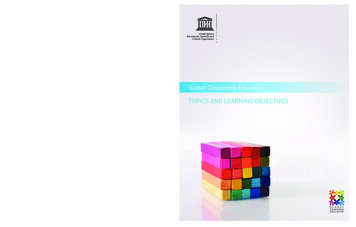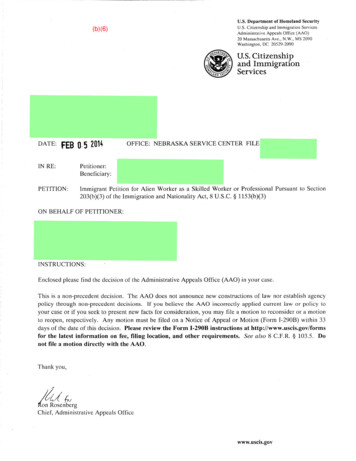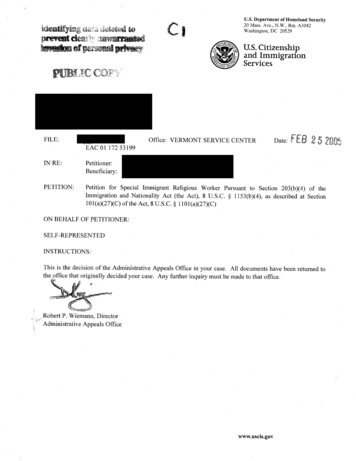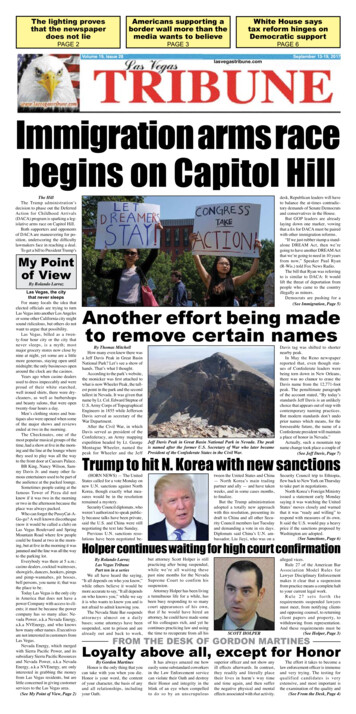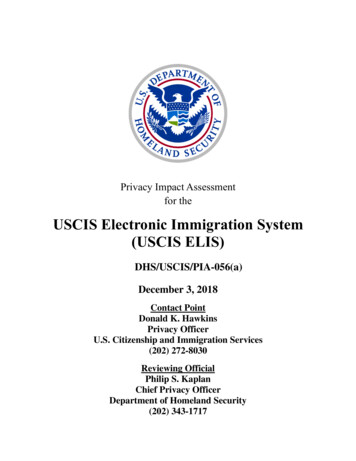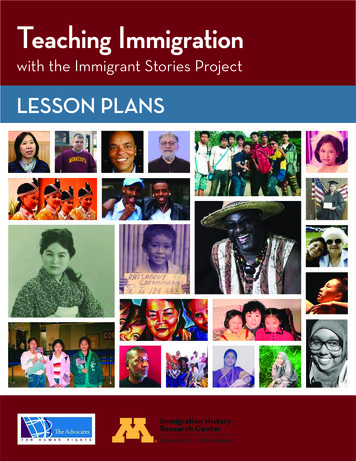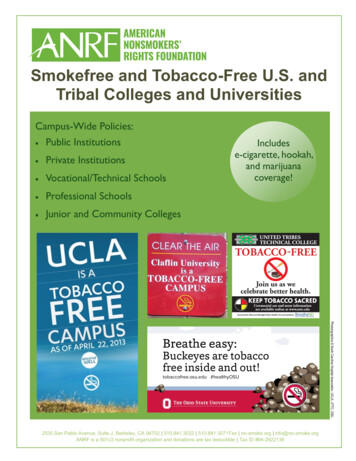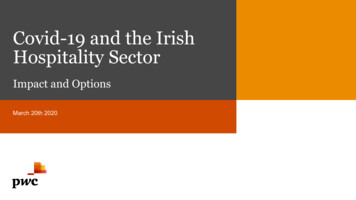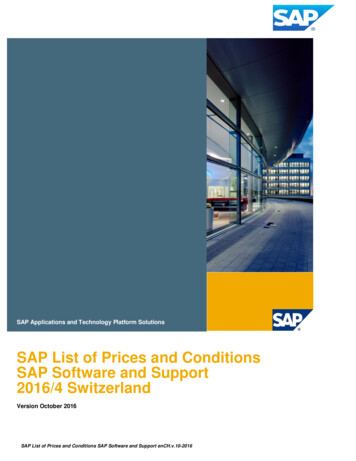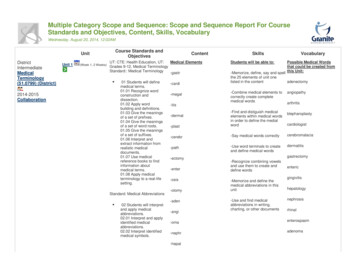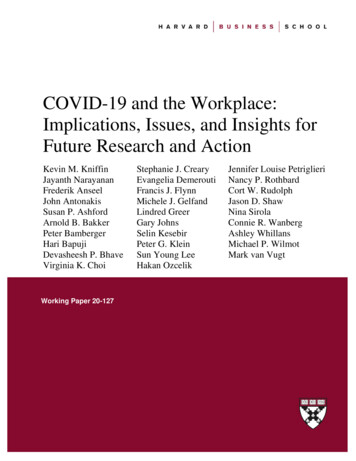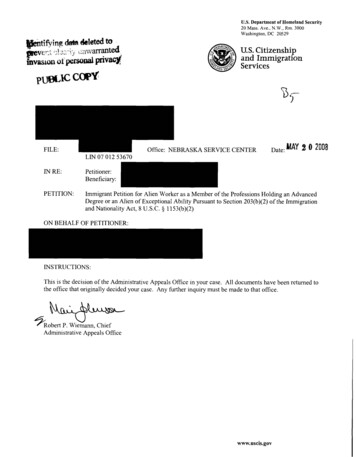
Transcription
U.S. Department of Homeland Security20 Mass. Ave. N.W., Rm. 3000Washington, DC 20529U.S. Citizenshipand ImmigrationServicesLIN 07 012 53670PETITION:Immigrant Petition for Alien Worker as a Member of the Professions Holding an AdvancedDegree or an Alien of Exceptional Ability Pursuant to Section 203(b)(2) of the Immigrationand Nationality Act, 8 U.S.C. 3 1153(b)(2)ON BEHALF OF PETITIONER:INSTRUCTIONS:This is the decision of the Administrative Appeals Office in your case. All documents have been returned tothe office that originally decided your case. Any further inquiry must be made to that office.U*RobertP. Wiernann, ChiefAdministrative Appeals Office
DISCUSSION: The Director, Nebraska Service Center, denied the employment-based immigrantvisa petition, which is now before the Administrative Appeals Office (AAO) on appeal. The appealwill be dismissed.The petitioner is a software developer. It seeks to employ the beneficiary permanently in the UnitedStates as a software engineer pursuant to section 203(b)(2) of the Immigration and Nationality Act (theAct), 8 U.S.C. 4 1153(b)(2). As required by statute, an ETA Form 9089 Application for AlienEmployment Certification approved by the Department of Labor (DOL), accompanied the petition.Upon reviewing the petition, the director determined that the beneficiary did not satisfy theminimum level of education stated on the labor certification. Specifically, the director determinedthat the beneficiary did not possess a foreign equivalent degree to a U.S. baccalaureate in a fieldrelated to the fields specified on the alien employment certification.On appeal, counsel submits a brief and additional evidence. For the reasons discussed below, weuphold the director's decision.In pertinent part, section 203(b)(2) of the Act provides immigrant classification to members of theprofessions holding advanced degrees or their equivalent and whose services are sought by anemployer in the United States. An advanced degree is a United States academic or professionaldegree or a foreign equivalent degree above the baccalaureate level. 8 C.F.R. 4 204.5(k)(2). Theregulation further states: "A United States baccalaureate degree or a foreign equivalent degreefollowed by at least five years of progressive experience in the specialty shall be considered theequivalent of a master's degree. If a doctoral degree is customarily required by the specialty, thealien must have a United States doctorate or a foreign equivalent degree." Id.The beneficiary possesses a foreign three-year Bachelor of Science degree from the University ofRajasthan and an "Honours Diploma" in Information and Systems Management from Aptech. Thus,the issues are whether either degree is a foreign degree equivalent to a U.S. baccalaureate degree.We must also consider whether the beneficiary meets the job requirements of the proffered job as setforth on the alien employment certification.Eligibility for the Classification SoughtAs noted above, the ETA Form 9089 in this matter is certified by DOL. DOL's role is limited todetermining whether there are sufficient workers who are able, willing, qualified and available andwhether the employment of the alien will adversely affect the wages and working conditions of workersin the United States similarly employed. Section 212(a)(5)(A)(i) of the Act; 20 C.F.R. 5 656.1(a).It is significant that none of the above inquiries assigned to DOL, or the remaining regulationsimplementing these duties under 20 C.F.R. 5 656, involve a determination as to whether or not the alienis qualified for a specific immigrant classification or even the job offered. This fact has not goneunnoticed by federal circuit courts. See Tongatapu Woodcraft Hawaii, Ltd. v. Feldman, 736 F. 2d1305, 1309 (9thCir. 1984); Madany v. Smith, 696 F.2d 1008, 1012-1013 (D.C. Cir. 1983).
The AAO is bound by the Act, agency regulations, precedent decisions of the agency and publisheddecisions from the circuit court of appeals from whatever circuit that the action arose. See N.L.R.B.v. Ashkenazy Property Management Corp., 8 17 F.2d 74, 75 (9th Cir. 1987)(administrative agenciesare not free to refuse to follow precedent in cases originating within the circuit); R.L. Inv. Ltd.Partners v. INS, 86 F. Supp. 2d 1014, 1022 (D. Haw. 2000), afd 273 F.3d 874 (9th Cir.2001)(unpublished agency decisions and agency legal memoranda are not binding under the APA,even when they are published in private publications or widely circulated). Even CIS internalmemoranda do not establish judicially enforceable rights. See Loa-Herrera v. Trominski, 23 1 F.3d984, 989 (5thCC. 2000)(An agency's internal guidelines "neither confer upon [plaintiffs] substantiverights nor provide procedures upon which [they] may rely.")A United States baccalaureate degree is generally found to require four years of education. Matterof Shah, 17 I&N Dec. 244 (Regl. Commr. 1977). This decision involved a petition filed under8 U.S.C. 1 153(a)(3) as amended in 1976. At that time, this section provided:Visas shall next be made available . . . to qualified immigrants who are members ofthe professions . . . .The Act added section 203(b)(2)(A) of the Act, 8 U.S.C. 1153(b)(2)(A), which provides:Visas shall be made available . . . to qualified immigrants who are members of theprofessions holding advanced degrees or their equivalent . . . .Significantly, the statutory language used prior to Matter of Shah, 17 I&N Dec. at 244 is identical tothe statutory language used subsequent to that decision but for the requirement that the immigranthold an advanced degree or its equivalent. The Joint Explanatory Statement of the Committee ofConference, published as part of the House of Representatives Conference Report on the Act,provides that "[in] considering equivalency in category 2 advanced degrees, it is anticipated that thealien must have a bachelor's degree with at least five years progressive experience in theprofessions." H.R. Conf. Rep. No. 955, 101" Cong., 2ndSess. 1990, 1990 U.S.C.C.A.N. 6784, 1990WL 201613 at *6786 (October 26, 1990).At the time of enactment of section 203(b)(2) of the Act in 1990, it had been almost thirteen yearssince Matter of Shah was issued. Congress is presumed to have intended a four-year degree when itstated that an alien "must have a bachelor's degree" when considering equivalency for secondpreference immigrant visas. We must assume that Congress was aware of the agency's previoustreatment of a "bachelor's degree" under the Act when the new classification was enacted and didnot intend to alter the agency's interpretation of that term. See Lorillard v. Pons, 434 U.S. 575, 58081 (1978)(Congress is presumed to be aware of administrative and judicial interpretations where itadopts a new law incorporating sections of a prior law). See also 56 Fed. Reg. 60897, 60900 (Nov.29, 1991) (an alien must have at least a bachelor's degree).In 1991, when the final rule for 8 C.F.R. 204.5 was published in the Federal Register, theImmigration and Naturalization Service (the Service), responded to criticism that the regulation
Page 4required an alien to have a bachelor's degree as a minimum and that the regulation did not allow forthe substitution of experience for education. After reviewing section 121 of the Immigration Act of1990, Pub. L. 101-649 (1990), and the Joint Explanatory Statement of the Committee of Conference,the Service specifically noted that both the Act and the legislative history indicate that an alien musthave at least a bachelor's degree:The Act states that, in order to qualify under the second classification, alien membersof the professions must hold "advanced degrees or their equivalent." As thelegislative history . . . indicates, the equivalent of an advanced degree is "a bachelor'sdegree with at least five years progressive experience in the professions." Becauseneither the Act nor its legislative history indicates that bachelor's or advanced degreesmust be United States degrees, the Service will recognize foreign equivalent degrees.But both the Act and its legislative history make clear that, in order to qualify as aprofessional under the third classification or to have experience equating to anadvanced degree under the second, an alien must have at least a bachelor's degree.56 Fed. Reg. 60897,60900 (Nov. 29, 199l)(emphasis added).There is no provision in the statute or the regulations that would allow a beneficiary to qualify undersection 203(b)(2) of the Act as a member of the professions holding an advanced degree withanything less than a full baccalaureate degree. More specifically, a three-year bachelor's degree willnot be considered to be the "foreign equivalent degree" to a United States baccalaureate degree.Matter of Shah, 17 I&N Dec. at 245. Where the analysis of the beneficiary's credentials relies onwork experience alone or a combination of multiple lesser degrees, the result is the "equivalent" of abachelor's degree rather than a "foreign equivalent degree."' In order to have experience andeducation equating to an advanced degree under section 203(b)(2) of the Act, the beneficiary musthave a single degree that is the "foreign equivalent degree" to a United States baccalaureate degree.8 C.F.R. 5 204.5(k)(2). As explained in the preamble to the final rule, persons who claim to qualifyfor an immigrant visa by virtue of education or experience equating to a bachelor's degree mayqualify for a visa pursuant to section 203(b)(3)(A)(i) of the Act as a skilled worker with more thantwo years of training and experience. 56 Fed. Reg. at 60900.The petitioner does not attempt to distinguish Matter of Shah, 17 I&N Dec. at 244. Rather, thevetitioner advocates for a contrarv finding." in this matter. Initiallv. the vetitioner submitted twokvaluations, one fromat Career Consulting nternationai(CCI) and one from Dr.at Marquess Educational Consultants (MEC). Both evaluations conclude that thebeneficiary's three-year degree from the University of Raiasthan is equivalent to a U.S. Bachelor ofScience Degree. he evaluation from CCI lists l-20 credits, althoughdoes not explainhow she determined the number of credits for each course other than referencing "contact" hours andd',Compare 8 C.F.R. 8 214.2(h)(4)(iii)(D)(S)(definingfor purposes of a nonimmigrant visaclassification, the "equivalence to completion of a college degree" as including, in certain cases, aspecific combination of education and experience). The regulations pertaining to the immigrantclassification sought in this matter do not contain similar language.
does not reference a single publication on evaluating academic degreesCarnegie Units.that concludes "contact" hours are a reliable and accepted method of determining equivalencies. Wenote that the beneficiary's transcript does not contain credit hour information.Although programs, degree requirements and specializations differ in variousrespects, it is the judgment of Career Consulting International that [the beneficiary's]international course work is comparable to a Bachelor of Science in ComputerScience from a Regionally Accredited Institution of Higher Education in the UnitedStates of America. Thus, for professional employment and for immigration purposes- per 8 C.F.R. section 214.2(h)(4)(iii)(D) - [the beneficiary] may be considered tohave completed studies, which are comparable to a Bachelor of Science from aRegionally Accredited Institution of Higher Education in the United States ofAmerica.(Emphasis added.) At issue is not whether the coursework may, in some respects, be "comparable."The issue is whether the beneficiary has a degree that is a foreign equivalent degree. Significantly,the regulation at 8 C.F.R. 5 214.2(h)(4)(iii)(D), relating to nonimmigrants, allows for evidence of"[e]quivalence to completion of a college degree." Subparagraph (5) of this provision allows for thecombination of education and experience. The general language cited by Dr. Danzig does notappear in the regulation relevant to the immigrant classification sought, 8 C.F.R. 5 204.5(k), whichrequires a foreign equivalent degree to a U.S. baccalaureate. We note that the beneficiary'stranscript reflects only chemistry, botany, zoology, Hindi and English classes. Dr. Danzig does notexplain how this limited subject matter compares to the general and broad education required for afour-year baccalaureate in the United States.further asserts: "UNESCO clearly recommends that the 3 and 4 year Indian degreeshould be treated as equivalent to a bachelor's degree by all UNESCO members." She providesthree website addresses in support of this assertion and subsequently quotes the following UNESCOrecommendation:Member States should take all feasible stops within the framework of their nationalsystems and in conformity with their constitutional, legal and regulatory provisions toencourage the competent authorities concerned to give recognition, as defined inparagraph l(e), to qualifications in higher education that are awarded in the otherMember States.then lists British and U.S. universities that admit into graduate programs those withthree-year Indian degrees. She notes that in the United States, some colleges issue baccalaureatedegrees in less than four years where "the assessment of prior learning is taken into account."also cites "accelerated programs at the bachelor's level now offered by accreditedschools in the United States and the UNESCO recommendation.concludes that if a
Page 6three-year baccalaureate is recognized as an appropriate admission to graduate school in India, itshould be similarly recognized in the United States.mthr:,":me Value of Degree Depend on the Color of YourThe petitioner also suThe record contains no evidence that this articleSkin?" coauthored byhas actually been published in addition to being posted on a website. The article indicates that anIndian three-year degree "often" involves more than 1800 credit hours and that the Indian system"presupposes that general education (pre-major studies) occur at the Intermediate level." The articleincludes British colleges that accept three-year degrees for admission to graduate school butconcedes that "a number of other universities" would not accept three-year degrees for admission tograduate school. Similarly, the article lists some U.S. universities that accept three-year degrees foradmission to graduate school but acknowledges that others do not. In fact, the article concedes:None of the members of N.A.C.E.S. who were approached were willing to grantequivalency to a bachelor's degree from a regionally accredited institution in theUnited States, although we heard anecdotally that one, W.E.S. had been interested indoing so. In this process, we encountered a number of the objections to equivalency that havealready been discussed.thus,Ed.D., President of Educational Credential Evaluators, Inc., commented"Contrary to your statement, a degree from a three-year "Bologna Process" bachelor'sdegree program in Europe will NOT be accepted as a degree by the majority ofuniversities in the Untied States. Similarly, the majority do not accept a bachelor'sdegree from a three-year program in India or any other country except England.England is a unique situation because of the specialized nature of Form VI."International Education Consultants of Delaware, Inc., raise similar objections tothose raised by ECE.,"The Indian educational system, along with that of Canada and some other countries,generally adopted the UK-pattern 3-year degree. But the UK retained the importantpreliminary A level examinations. These examinations are used for advancedstanding credit in the UK; we follow their lead, and use those examinations toconstitute the an [sic] additional year of undergraduate study. The combination ofthese two entities is equivalent to a 4-year US Bachelor's degree.The Indian educational system dropped that advanced standing year. You enter a 3year Indian degree program directly from Year 12 of your education. In the US, there
are no degree programs entered from a stage lower than Year 12, and there are no 3year degree programs. Without the additional advanced standing year, there's noequivalency.Finally, these materials do not examine whether those few U.S. institutions that may accept a threeyear degree for graduate admission do so on the condition that the holder of a three-year degreecomplete extra credits.The petitioner also submitted 138 pages of UNESCO materials, only two of which are relevant. Therecommendation provided relates to "recognition" of qualifications awarded in higher education.Paragraph 1(e) defines recognition as follows:'Recognition" of a foreign qualification in higher education means its acceptance bythe competent authorities of the State concerned (whether they be governmental ornongovernmental) as entitling its holder to be considered under the same conditionsas those holding a comparable qualification awarded in that State an deemedcomparable, for the purposes of access to or further pursuit of higher educationstudies, participation in research, the practice of a profession, if this does not requirethe passing of examinations or further special preparation, or all the foregoing,according to the scope of the recognition.The UNESCO recommendation relates to admission to graduate school and training programs andeligibility to practice in a profession. Nowhere does it suggest that a three-year degree must bedeemed equivalent to a four-year degree for purposes of qualifying for a class of individuals definedby statute and regulation as eligible for immigration benefits.More significantly, therecommendation does not define "comparable qualification." At the heart of this matter is whetherthe beneficiary's degree is, in fact, the foreign equivalent of a U.S. baccalaureate. The UNESCOrecommendation does not address this issue.Significantly, the petitioner filed a previous petition in behalf of the beneficiary, receipt numberLIN-06-098-52014. In support of that petition, the petitioner submitted an evaluation of thepetitioner's education from the Trustforte Corporation. Consistent with Matter of Shah, 17 I&NDec. at 244, the Trustforte evaluation addresses the petitioner's Bachelor of Science as follows: "theNature of the courses and the credit hours involved indicate that he completed the equivalent of threeyears of acdemic studies toward a Bachelor of Science Degree at an accredited US college oruniversity."Citizenship and Immigration Services (CIS) may, in its discretion, use as advisory opinionsstatements submitted as expert testimony. See Matter of Caron International, 19 I&N Dec. 791, 795(Commr. 1988). However, CIS is ultimately responsible for making the final determinationregarding an alien's eligibility for the benefit sought. Id. The submission of letters from expertssupporting the petition is not presumptive evidence of eligibility; CIS may evaluate the content ofthose letters as to whether they support the alien's eligibility. See id. at 795. CIS may even give lessweight to an opinion that is not corroborated, in accord with other information or is in any way.
questionable. Id. at 795; see also Matter of Soffici, 22 I&N Dec. 158, 165 (Commr. 1998) (citingMatter of Treasure Craft of California, 14 I&N Dec. 190 (Regl. Commr. 1972)).are not consistent with the previousIn this matter, the opinions of- andevaluation of the petitioner's degree or, indeed, the materials submitted in support of theirevaluations. It is incumbent upon the petitioner to resolve any inconsistencies in the record byindependent objective evidence. Matter of Ho, 19 I&N Dec. 582, 591-92 (BIA 1988). Any attemptto explain or reconcile such inconsistencies will not suffice unless the petitioner submits competentobjective evidence pointing to where the truth lies. Id.Because the beneficiary does not have a "United States baccalaureate degree or a foreign equivalentdegree," the beneficiary does not qualify for prefe
bachelor's degree rather than a "foreign equivalent degree."' In order to have experience and education equating to an advanced degree under section 203(b)(2) of the Act, the beneficiary must have a single degree that is the "foreign equivalent degree" to a United States baccalaureate degree.
